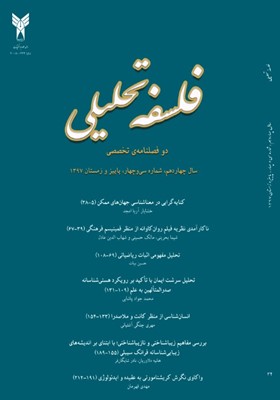تحلیل مفهومی اثبات ریاضیاتی
محورهای موضوعی : فلسفه
کلید واژه: استدلال, درستی, اجماع, قانعکنندگی, مقبولیت نهادی, دقت, وارسیپذیری,
چکیده مقاله :
وجه یا وجوه اشتراک اثباتهای ریاضیاتی کدامند؟ تاکنون پاسخهای مختلفی به این پرسش ارائه شده است. برخی اساساً منکر هر نوع اشتراک مفهومی بین اثباتها هستند، و برخی دیگر قائل به دوگانگی یا چندگانگی مفهومی اثباتهای ریاضی هستند. یعنی اثباتها را در ذیل دو یا چند هسته مفهومی اساساً متمایز قرار می دهند. در این مقاله نشان میدهم که اولاً اثباتهای ریاضی و غیر ریاضی از یک مقولهى واحد یعنی استدلال موفق یا درست هستند؛ ثانیاً در همه اثباتهای ریاضیاتی و در همه تلقیهایی که از این افراد بیان شده، یک استدلال باید متضمن الگوهایی دقیق، وارسی پذیر و اعتمادپذیر، در همه جهانهای ممکن، باشد. اگر دو شرط اول برقرار باشند استدلال مذکور میتواند متصف به صفت ریاضیاتی شود؛ و اگر شرط سوم برقرار باشد استدلال ریاضی مذکور میتواند متصف به صفت درست شود. بنابراین در همه اثباتهای ریاضی و در همه تلقیها از اثباتهای ریاضی چهار مؤلفه مفهومی مشترک هستند: استدلال، دقت، وارسیپذیری، درستی. ثالثاً اختلافنظرها درباره مفهوم اثبات ریاضی ریشه در تعبیرها و تفسیرهای مختلف فیلسوفان و ریاضیدانان از این مؤلفهها دارد. یعنی درباره هر کدام از این چهار مؤلفه اساسی، تلقیها و معیارهای مختلفی از سوی ریاضیدانان و فیلسوفان معرفی شده است.
What are the common attributes of the mathematical proofs? Various answers to this question have been provided: Some deny any conceptual commonness among proofs, while others accept the conceptual duality or multiplicity of mathematical proofs. They believe that “the mathematical proof” refers to two or more distinct concepts sharing the "same name". This paper shows that, first, the mathematical and non-mathematical proofs are instances of a vague and single concept: the successful or correct reasoning. And second, in all mathematical proofs and their definitions, an argument pattern must meet three conditions: being rigour, surveyable, and reliable in all possible words. If the first two conditions are met, the mentioned argument can be characterized as "mathematical"; and if the third condition is satisfied, that argument can be characterized as "correct". So four conceptual components, in all mathematical proofs and their definitions, are common: argument, being rigour, surveyability, and correctness. Thirdly, all disagreements about the concept of mathematical proof are due to different interpretations of each of the four aforementioned components. That is, several philosophers and mathematicians have proposed different interpretations of each of the four basic components of the mathematical proof.
_||_

